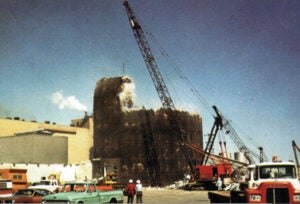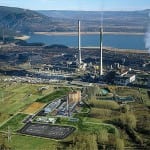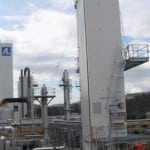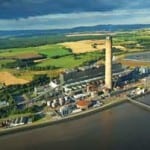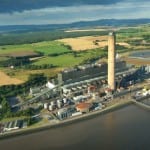Doosan Babcock Energy on Friday switched on what it is calling the “world’s largest” oxyfuel combustion carbon capture and storage (CCS) facility in Renfrew, Scotland. The facility will demonstrate that company’s OxyCoal Clean Combustion system for the first time on a full-size 40-MW burner.
Oxyfuel combustion is a process by which coal is burned in an atmosphere of oxygen and recycled flue gas—rather than air—to create an output stream that consists of almost pure carbon dioxide gas and water vapor. The carbon dioxide is then cleaned, compressed, and piped away for injection into underground storage chambers.
The £7.5 million pilot plant’s 40-MW burner measures 56 feet long, 18 feet wide, and 18 feet tall. It will undergo 20 days’ testing until December. If successful, the technology will then be fitted to new or existing coal plants.
The project is a collaboration between Doosan Babcock, the UK government’s Department of Energy and Climate Change (DECC), Scottish and Southern Energy, and a group of seven sponsors, which include Air Products, Drax, Denmark’s DONG Energy, France’s EDF, Germany’s E.ON, ScottishPower, and Sweden’s Vattenfall. It is also supported by UK coal.
Vattenfall has been operating an oxyfuel pilot plant at Schwarze Pumpe in Germany that connects CCS technology in a full-chain working system since last September. If successful, the 30 MW plant will be scaled up in a demonstration plant at Jänschwalde, Germany, so that the oxyfuel boiler would be 650 MW thermal (around 250 MW electric). It would be the last step before the technology will be commercially introduced. Construction of that plant is expected in 2011.
The UK is pushing coal power generators to demonstrate CCS, mostly to secure its share of the £2 billion to £4 billion a year that has been estimated for the global CCS market by 2030 by a recent, independent study on the value of coal carbon abatement technology to UK industry.
Last year, the UK sponsored a contest whose winner would secure £1 billion in funding for a postcombustion technology that captures 90% of emitted greenhouse gases at a 300-MW to 400-MW coal-fired unit. Three companies are in the running for the award: ScottishPower, E.ON, and Peel Power.
ScottishPower on May 29 flicked on the switch of a CCS pilot program at its 2,304-MW coal-fired Longannet power plant, in Fife, Scotland. Meanwhile, E.ON in June said it could demonstrate Mitsubishi Heavy Industries’ KM-CDR process—which uses a proprietary solvent (KS-1) for CO2 absorption and desorption—at a 1,600-MW supercritical pressure coal plant proposed for the Kingsnorth Station in Kent. Peel Power has joined forces with Denmark’s DONG Energy and Germany’s RWE to build a facility — though its scope has not been described yet. The government is expected to announce the winner this summer.
But the government is also sponsoring precombustion CCS technologies. Energy Minister Joan Ruddock, who opened the project, said that cleaning up coal power was necessary if the country is to meet its climate change goals while keeping the lights on. “The development of CCS offers high quality jobs and export opportunities for the UK which is why we’re supporting this OxyCoal project with £2.2 million of funding. Our proposals on coal are some of the most radical in the world and will help ensure the UK leads the way on CCS.”
The government’s backing of the project would allow pioneers of new CCS technologies to make gains, said Scottish and Southern Energy CEO Ian Marchant. “The pace of progress in recent years has been disappointing, but I hope that renewed impetus from government allied to the type of co-operation evident in the OxyCoal project will bring us closer to the ultimate goal of successful deployment of large-scale carbon capture and storage technology here in the UK and elsewhere.”
Sources: Doosan Babcock, DECC, POWER




